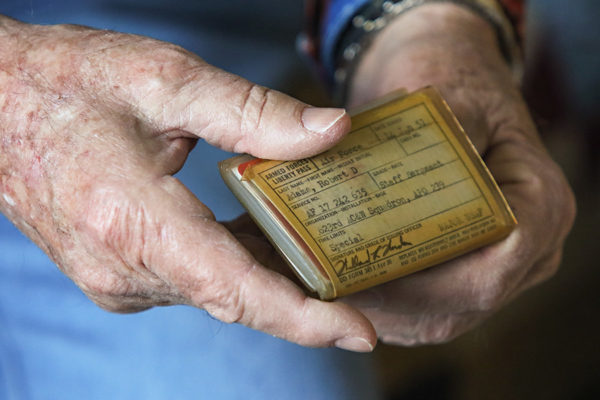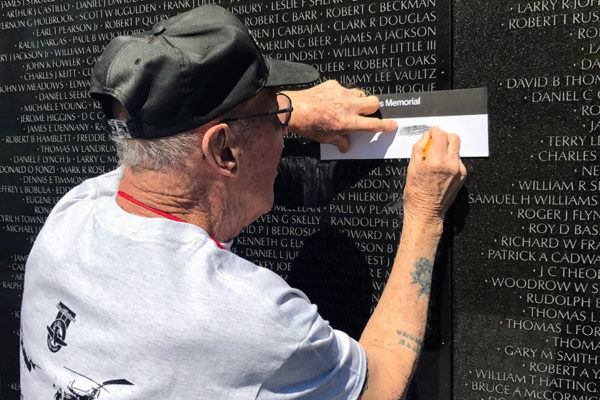When Bob Adams first arrived on Okinawa Island in 1948, it was a quiet tropical isle some 400 miles off the coast of mainland Japan. Although the island remained part of Japan, the American military was its dominant force in the years following World War II. Adams had been assigned there as a radio operator for the U.S. Air Force.
“It was a peaceful place,” Adams said of his early days on the island in the late 1940s and early 1950s. “It was easygoing.”
But that all changed at dawn on June 25, 1950, when the Korean People’s Army led by Kim Il-sung crossed the 38th parallel in a surprise attack on South Korea. Within days, the North Koreans, backed and armed by the Soviet Union, had pushed the South Korean military out of Seoul and taken the capital. In a matter of weeks, the pro-Western South Koreans held only a small piece of territory on the southern end of the peninsula around the city of Pusan.
U.S. President Harry Truman feared that the total collapse of South Korea would inspire the Soviet Union to keep “right on going and swallow up one place after another.” Two days after the invasion, Truman announced that he was sending American troops to support the beleaguered South Koreans. Suddenly Okinawa became a hotbed of military activity.
“It got busier than heck,” Adams recalled last week from his room at the Montana Veterans Home in Columbia Falls. “Boats were constantly arriving and unloading bombs, and bombers were constantly taking off. We had piles of bombs everywhere.”

The invasion of South Korea 67 years ago set off a power struggle on the Korean Peninsula that continues today. Earlier this month, Kim Il-sung’s grandson and the current supreme leader of North Korea, Kim Jong-un, announced that his military would “reduce America to ashes” if provoked. Meanwhile, the international community has grown concerned about the secretive nation’s efforts to develop nuclear weapons and missiles capable of striking Seoul, Japan and even the United States.
“It’s just ridiculous,” said Wayne Bolton, a local Korean War veteran who keeps a close eye on the news out of Asia. “I never thought this conflict would last this long.”
At the end of World War II, Korea, which had been under Japanese control for most of the 20th century, was split at the 38th parallel. The Soviet Union accepted Japan’s surrender north of that line and the Americans accepted it south of there. While the Allies had hoped to establish a unified government for the entire peninsula, neither side could agree on how that would work. In 1948, the divided Koreas established their own governments — a Soviet-backed communist government in the north and an American-backed anti-communist government in the south.
According to historians, Kim Il-sung had wanted to invade the south in early 1950, but the Soviets were reluctant to back such efforts because of the presence of American troops. That changed later in the year when U.S. soldiers finally went home, leaving just a small South Korean military to protect the south end of the peninsula.
Within days of the invasion in June 1950, American troops were being readied. Bolton, a Butte native who joined the U.S. Marine Corps in 1948, was told to report to duty as soon as possible. By the time he arrived in Asia in August, American troops were helping the South Koreans defend Pusan. Just a few days into the battle, Bolton was shot below the waist by a sniper.
“It was a superficial wound,” he said. “It went in one side and out the other, so they patched me up and I was back on the front lines a week later.”
Through the fall of 1950, South Korean, American, and United Nations forces pushed the communists north. In September, they recaptured Seoul and then crossed the 38th parallel into North Korea. By November, American forces had captured most of the peninsula and were approaching the Chinese border. On Nov. 27, Chinese forces that were supporting the North Koreans surprised the Americans, launching a 17-day battle for the Chosin Reservoir. Outnumbered and unprepared, American, South Korean, and British troops battled a Chinese army twice their size.
Bolton recalled that the Chinese would often wait until nightfall to attack and were better prepared for the extreme winter weather of Korea.
“It was 40 below most of the time,” Bolton said. “Our guns would freeze up and our weapons wouldn’t work. We just weren’t prepared.”

Approximately 2,000 Americans were killed and 1,000 wounded during the Battle of the Chosin Reservoir. Despite having a much larger force, the Chinese also lost thousands of troops. The Marine Corps eventually pulled out from the border region, and the war’s frontlines returned to the 38th parallel. The battle between north and south remained intense in the ensuing years, entrenched along the 38th parallel.
Eugene Hamann was a Libby native in the U.S. Navy and today lives at the Montana Veterans Home. He recalls firefights that were so vicious, he would stop to put two pieces of wood on either side of his machine gun because relentless shooting made the weapon literally too hot to handle. Along the border, Hamann said, he and his fellow soldiers were always on guard for attack.
“You never dared build a fire, because if you did, they’d attack,” he said. “We ate cold beans and cornbread for days. I still don’t like beans and cornbread, even today.”
Hamann was aboard the USS Sarsi, a small ocean tug, when it struck a mine in the middle of the night in August 1952. Hamann said he was sleeping in a bunk when the explosion happened and was knocked six feet below onto the cold, hard steel deck. The ship sunk in under 20 minutes, and Hamann and the other survivors spent 24 hours in a raft waiting for help. Seven decades later, Hamann still vividly remembers the water “that was too cold even for sharks.”
Hamann and the others were rescued the following day. Aboard the ship, the survivors were checked for injuries and given warm clothing. While talking to someone who was examining him, Hamann mentioned that he was from Libby. The other soldier said he had an uncle who lived there and quickly ran off. Moments later, he came back with a double shot of whiskey for Hamann.
“I started warming up then,” Hamann said.
In 1952, both sides began to negotiate an armistice, but the transfer of prisoners of war became a sticking point, dragging out the talks for more than a year. Finally, in June 1953, a ceasefire agreement was signed, establishing a 2.5-mile wide, 160-mile long demilitarized zone between North and South Korea as a buffer until formal peace could be achieved.
That peace treaty never came and thousands of troops remain on either side of the border. University of Montana history professor Harry Fritz said in order to understand the tensions today, it’s critical to understand what happened seven decades ago.
“The North Korean government has never changed,” Fritz said. “It’s still an authoritarian government ruled by the same family, just as it was when the Korean War ended.”
Hamann believes that President Truman should have heeded the advice of General Douglas MacArthur, who led the war effort until being fired in 1951, and forcibly reunited the peninsula. He said it’s frustrating that nearly 70 years later the conflict remains unresolved.
“It’s going to be a problem for a long time until the North Korean government is knocked out of there,” he said. “I’ll never forgive Truman for not finishing the job.”
Bolton said he understands why Truman was hesitant to continue fighting, especially if the Chinese and Soviets would have gotten more involved. Bolton, who stayed in the military until 1976, still keeps a close eye on news out of North Korea and believes that eventually the battle will resume.
“It will end in warfare eventually,” he said. “North Korea has enough artillery on the DMZ to annihilate Seoul.”
In April, Bolton, with the help of Glacier High School senior Tristen Lang, had the opportunity to take an Honor Flight to Washington D.C. to see the Korean and Vietnam war memorials. The 84-year-old veteran said it was a moving experience to see the memorials and visit with other Korean veterans.
For years, the Korean War has been nicknamed the “forgotten war.” Fritz said that’s because the wars on either side of it — World War II and the Vietnam War — often receive more attention by historians. But as tensions rise on the Korean Peninsula, Fritz and others say it’s important to become reacquainted with that conflict’s history.
“No one who knows history forgets the Korean War,” Fritz said. “Certainly no one who fought in it will forget it either.”
